Reflected glory isn’t enough – maybe it was never enough. Now some writers are demanding an explicit share of the glory when anthologies win awards.
Nuzo Onoh, a Nigerian-British writer of Igbo descent popularly known as the “Queen of African Horror”, wrote in an open letter posted immediately after the Locus Awards were announced last weekend: “A Best Anthology Award should be an award for every contributor to the book and not just for the editors.” Her call is gaining traction.
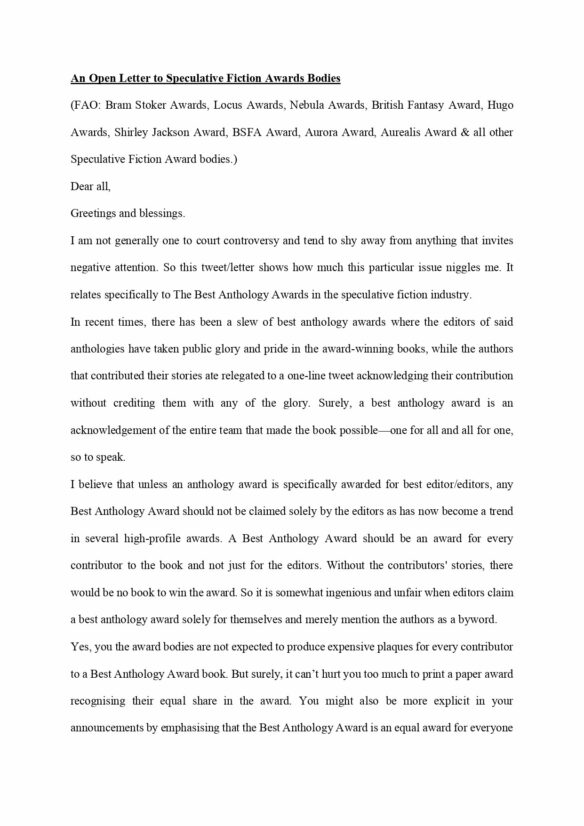
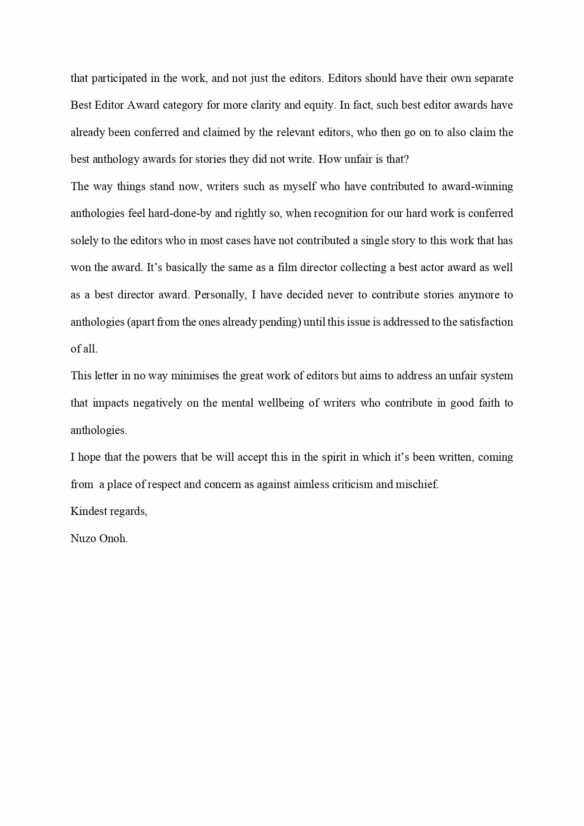
What supporters are pressing for is that everyone with a story in the anthology be treated as sharing any Best Anthology award. “Pins or certificates and names included should be happening for all award-winning anthologies. The editor steers the ship, but writers should be publicly credited,” tweeted Dan Coxon, a 2022 British Fantasy Award winner.
A few of the groups with Best Anthology awards have already responded.
L. D. Lewis of the Ignyte Awards:

The Ignyte Awards now display “Featuring works by” information for the 2023 finalists, having recently added the names of writers to Best Anthology/Collected Works titles that previously showed only the names of the editors. L. D. Lewis said:

Nuzo Onoh has also heard from the Locus Award people:
There has been much behind-the-scenes discussion that this represents a backlash against one or more editors of recent award-winning anthologies. For example:
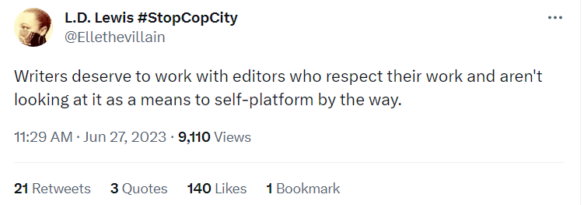
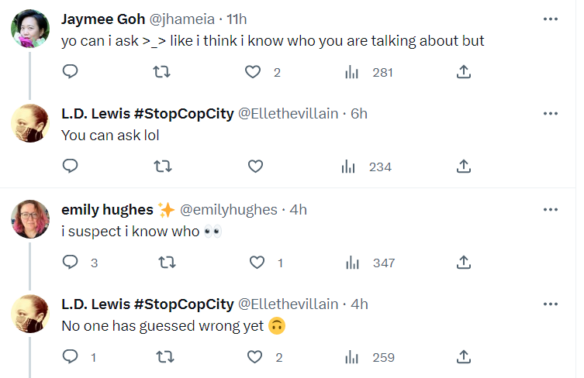
Eugen Bacon said:
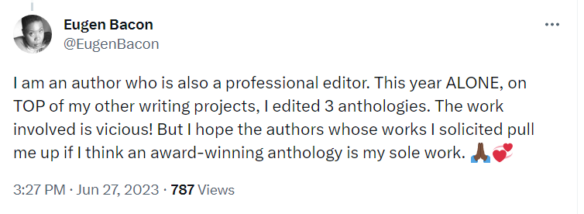
However, Nuzo Onoh today tweeted:
Although neither the Hugos, the Nebulas, nor the Seiun Awards have a Best Anthology category, many other major international sff awards have added one over the years.
The Locus Awards have had an Anthology category of some stripe since the second year of existence, 1972. (For the first several years it was restricted to Original Anthologies.) The World Fantasy Awards added a Best Anthology category in 1988. The Horror Writers Association and the British Fantasy Society each added a Best Anthology category to (respectively) the Bram Stoker Awards and British Fantasy Awards in 1999. In Australia, the Ditmar Awards given at the national convention have honored Collected Work since 2000, which encompasses anthologies and single-author collections, and the Aurealis Awards added a Best Anthology category in 2009.
The Hugos recognize fiction editors themselves, in a category created in 1973 and split in 2007 into two categories, for editing Long Form and Short Form works.
Discover more from File 770
Subscribe to get the latest posts to your email.

This is a total ‘duh’ moment in that yes, writers should be credited for books their work appears in and awarded similarly. Of course they should!
More, they always should have been–and I’d even go so far as to say past anthology awards should be revised to give credit to contributing writers.
I’m glad you wrote about this because I found the original tweet hard to read at first. (Lawn mowing day makes the screen get blurry for some reason… 🙂 )
Most people seem to have agreed with this. I saw a post or two that compared the Best Anthology Award to the Best Picture Award, pointing out that award goes to the producers and that the actors usually don’t get that award. But that could be an apples and oranges comparison.
Yes, this should happen.
An interesting suggestion.
I wonder if authors seeking that sort of endorsement will be just as enthusiastic at self-policing their peers that use such an acknowledgment inappropriately.
For example, an author might reasonably claim:
“Bob Smith is the author of “Man What A Story” which was included in the Big Deal Award Winning anthology “Stuff You’ll Really Love, edited by Xu Fang.
But if they claim:
“Bob Smith is the author of the Big Deal Award Winning “Man What A Story”
Will authors be quick to correct that misattribution?
Regards,
Dann
TANSTAAFL/TINSTAAFL/TNSTAAFL – Truth no matter how you slice it.
I appreciate the idea, but there are still others on the team who produced the book whose names aren’t even ON the book, except perhaps in the acknowledgments page, if there is one.
Admittedly in film we have started to see named acknowledgement of EVERYONE on the cast and crew in the credits, and publishing could do likewise. But that still doesn’t mean everyone on the project should get physical copies of any award it earns. It’s fine if the stopping point should be after the writers for anthologies, but there does have to be a stopping point.
The cost of making all those awards—and the time to present them all at an awards ceremony—means this is Not Going to Happen. My opinion, but the cost is, to use a word, prohibitive.
As I read it, Ms. Onoh isn’t asking for unique statues/plaques/medallions for each author. Only that they be listed as being part of an award-winning project. Printing something on fancy paper would be reasonable and not terribly expensive.
Heck, even just listing the authors on any awards announcement would probably satisfy her suggestion/request.
Regards,
Dann
“Karl Marx was right, socialism works, it is just that he had the wrong species” – Edward O. Wilson, The Ants
Dann665: That is indeed all she is asking for.
Once that is granted, it seems likely that others could argue “If I’m the co-winner of this award, I am also entitled to the hardware.” Which the award administrators could address by stating a limit on how many physical awards will be made available. Or permitting people to voluntarily pay for a copy they would otherwise not receive, up to whatever limit the artist (if any) is willing to make. Ideas which have been used by the Hugo Awards (though — with one exception — not in situations where there might be dozens of co-winners.)
@Mike
I think her request is reasonable, but share your concern about what the “next step” might be.
Regards,
Dann
It has been said that the sin of ingratitude is more serious than the sin of revenge. With revenge, we return evil for evil, but with ingratitude, we return evil for good. – W. Eugene Hansen
Some of the awards she is calling out don’t even have “Best Anthology” as an award category. Is she proposing that such a category be added?
Are there any other major awards for something similar*, where there’s a primary honoree(s) but the next level of contributors gets listed as well?
“Similar” being analogous to Editor/Anthology. Producers/Movie and Directors/Movie have been mentioned, but I don’t know of any film award where secondary contributors (actors, writers, etc.) also get named in addition to Producers or Directors.
I seem to be out of step with others here (c’est la vie as you US fans say…)
Hmmm. I am not entirely sure I go along with this suggestion. (Though I can easily understand why, on a superficial basis, it is being made.)
In my experience, there may be some anthologies I enjoy, but almost universally I never consider all the shorts they contain good. (Some good anthologies even contain one or two stinker stories!)
Also, some anthologies have a worthy factor that is independent of the quality of the stories. Some thematic anthologies covering many years trace the development of a trope. Here it is how the trope developed that is of interest and the compiling editor is the one who adds the value (not the individual authors).
Besides, if an anthology wins, say, a Hugo (which currently does not have such a category), then the author does get some value as they can put on their CV, and use for publicity, something like. “Such and such is the author of the short story ‘Insert Title’ that appeared in the Hugo Award-winning ‘Insert Anthology Title’.”
Also, is the Worldcon expected to list all the contributing authors on the ballot? And, what next, would all the authors expect Hugo trophies?
If they did then there could well be a rocket supply issue.
Further, with this proposal the work award administrators would have to do would soar: even the mailing of pins and certificates would mean a multiple of the degree of previous administrator work. God forbid an anthology of flash fiction stories each only two or three pages long should win an award. With paperbacks typically being 250 – 350 pages long that would mean about a hundred authors getting listed, certificates and pins!
NO states that currently this “impacts negatively on the mental well-being of writers… Really? Is this serious? (Quick check of diary to see that this is not the beginning of April.)
NO says that she will no longer contribute to anthologies until this issue is addressed. Here the terms ‘toys’ and ‘pram’ spring to mind.
(Besides, I can’t see that being a problem. If NO’s short stories are any good then she should have no problem getting a collection of stories published which would be eligible for awards with ‘short story’ categories and if winning would get all the credit.)
(Relatedly, I see from a scan of my bookshelves that I actually have very few anthologies, but do have far more collections. Possibly due to the stinker factor mentioned above.)
Also short story writers have their stories eligible for awards’ ‘short story’ categories. Plenty of credit there.
Finally, because short story writers do get benefit (with CV and promotion opportunity as I allude above) they are not in any way getting “unfair” treatment.
Finally – this time a real ‘finally’ – ON says at the beginning of her letter, “In recent times…” Let’s be clear, this is not a “recent issue”; the practice has been around since the dawn of awards for anthologies. Still, I guess there has to be a first time for everything.
For a good number of reasons I don’t buy into this idea: it is largely a non-issue. If this is serious and ON has “mental well-being” problems due to this issue then I hope she seeks and gets professional help. (And I mean this out of genuine concern and empathy.)
Have the advocates of this proposal addressed the issue of original anthologies vs. reprint anthologies? In a reprint anthology, the editor seems like the only person who has done original work for this particular publication. And there could additionally be eligibility questions concerning the previously published stories.
Dennis Howard: Just to provide information: One advocate (not the person named in the headline here) contends that in reprint anthologies the writers and the editors who originally bought (and presumably edited) the stories have already done most of the editing work. That is their argument.
Thanks, Mike. I suppose that is, as you say, an argument! But I don’t think it’s one that will impress anyone who has ever put together a reprint anthology.
It seems close to saying that if the authors in a reprint anthology can’t be recognized, then the editor shouldn’t be recognized either!
I don’t think that’s necessarily a fair argument to make about a reprint anthology that all the hard work has been done. Think about all the work Jeff and Ann Vandermeer put in to create The Big Book of Science Fiction, The Weird or The Big Book of Science Fiction.
Those are reprint anthologies, but VERY heavily curated to provide a historic overvew. And tracking down the rightsholders and negotiating for and getting the rights to all those stories wasn’t an easy thing. And I’m guessing that pitching those large, expensive books to publishers required a fair amount of heavy lifting as well.
I’m thankful for all the comments here and the insights I’ve gained from reading the different POVs. I’d like to reiterate our goal as contributors to award-winning anthologies. A few of your comments here have mentioned the administrative burden and costs involved in including all contributors in the award. I beg to differ. Simply issuing a certificate of recognition to all, as The Australian Shadows Award has now announced for their future awards, does not cost much, especially when it is emailed as a PDF that the contributors can print out and frame. It’s merely something tangible to show their work was involved in this award-winning anthology. Since a few organisations like the Hugo already give out best editor awards, it’s only fair therefore that the contributors share the best anthology awards with the editors and artists where applicable. Nobody is demanding plaques, just recognition for their hard work. Secondly, even for reprints, publicly adding the names of everyone in the ToC to the award, as Ignyte Awards has agreed to do is more than enough to show they’ve been recognised for their contribution without tracking down everyone individually. I have included award bodies like the Hugo who do not currently have a best anthology category, for the simple reason that everything is fluid. They might decide to add such a category in future as I believe they should, since they already have a best editor category. So, hopefully, should that happen, then they might be reminded by our campaign to consider making it all inclusive. Finally, my analogy remains the same – it would be unfair for a film director to receive both a best director award and best actor award. Editors should continue receiving the best editor/edited works award, while contributors should share the best anthology award with them. I am very grateful that two award bodies have already agreed to recognise contributors while Locus Awards will consider how to make it equal to all. It is a start and hopefully one that will spread across the various awards. The fact that several editors have added their support to this shows that it is a just cause and one that will ultimately be beneficial to all. I hope this has helped in some way to explain what our campaign is all about. As I said, one for all and all for one. Together we rise.
I honestly don’t see how there can be any serious objection to a simple certificate recognizing each of the contributing authors to the anthology, especially if it’s an emailed PDF for them to print out themselves. No significant cost, and no harm done to anyone. Just recognition of the authors.
If a story that originally appears in an anthology wins a Best Short Story/Novella/Novelette award, is the editor of that anthology equally entitled to be recognized as part of the fiction award?
@bill–No. Every story that’s published needs to be published somewhere. You know this. You’re reaching for a reductio ad absurdum,, where every editor gets awarded for every prize-winning story they publish.
When a story wins an award, it’s the individual story being awarded. When an anthology is awarded, it’s the whole package, the individual stories contribute rather directly to what is being awarded. And, we’re only talking about recognition; not treating every story in it as having won the award individually.
At the other extreme, you have magazines. It’s the total package the zine or the editor is being awarded for, but any individual story’s contribution is much smaller, and a larger number of lesser stories is possible, when the magazine or editor is being awarded for a whole year of periodical publication.
Lis it’s the whole package, the individual stories contribute rather directly to what is being awarded.
I totally concur.
Bill: If a story that originally appears in an anthology wins a Best Short Story/Novella/Novelette award, is the editor of that anthology equally entitled to be recognized as part of the fiction award?
Agreed. This proposal doesn’t hold water.
NO. The fact that several editors have added their support to this shows that it is a just cause and one that will ultimately be beneficial to all.
As Einstein is reputed to have said: “”One hundred German physicists claim Einstein’s theory of relativity is wrong.” Einstein’s reply was supposedly, “If I were wrong, it would only take one.” ”
That several editors have added support does not show just cause.
Having been published in anthologies myself, I see no problem with editors receiving an award for the very hard work of conceptualizing, promoting, formatting, contracting, dealing with authors and publishers, etc. It’s a (mostly) thankless job, so to try and make it all about yourself is, frankly, ridiculous.
I don’t need to grandstand about why my work should receive further accolades.